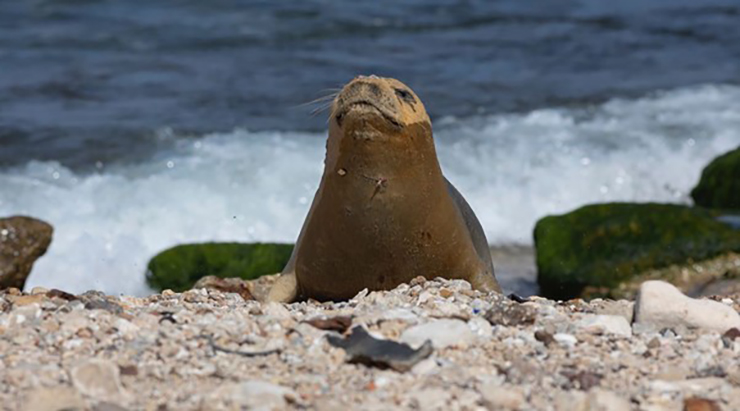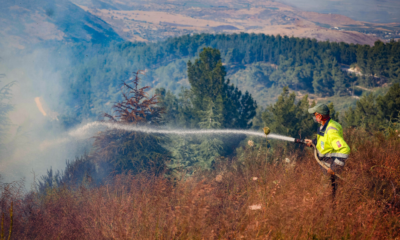
World

Endangered seal Yulia loves and leaves Israelis
JTA – For much of the past week, Israel’s latest unlikely celebrity lounged on Jaffa beach, drawing throngs of onlookers, constant media attention, and round-the-clock protection from the government as she sunbathed and slept the day away.
Then early on the afternoon of Tuesday, 23 May, the unwitting star named Yulia – a rare 6-foot (1.8m) species of seal weighing hundreds of pounds who has travelled the eastern Mediterranean – waded into the water and swam away. She left no sign of whether she would ever return.
Her departure has left some local residents bereft and others hopeful that she may find a safer home than a bare beach with little shelter, other animals, and litter. News of her departure spread quickly through the area’s social media and WhatsApp groups, one of which had even changed its name from “Friends of Jaffa” to “Friends of Yulia”.
“Of course, I know she’s not smiling, but her lips are formed in a way that makes her look like she is. She’s so utterly calm – even while a million people are watching her,” said Aya Zaken, a resident of the ancient city adjacent to Tel Aviv, who added that she was “deeply sad” that Yulia had returned to sea.
Seeing the mammal for the first time was a “much more moving” experience than she had expected, Zaken said, partly because of the seal’s size but also because of the effect she had on onlookers.
“When faced with her, I felt an overwhelming sense of calm, like a deep meditation,” Zaken said. “The feeling that this is so much bigger than me or my troubles.”
Yulia, who was given her name by a local boy who first discovered her, arrived on Jaffa’s beach on Friday. She had since been the subject of 24-hour surveillance both by the press and the Israel Nature and Parks Authority, which had sent volunteers to keep watch and ensure that the crowds of people who have gathered since her arrival didn’t disturb her.
Yulia is a Mediterranean monk seal, one of roughly 600 to 700 left in the world, according to the United States National Oceanic and Atmospheric Administration, though other estimates put the number even lower. The species is classified as endangered.
Yulia was listless and shaking when she first arrived on Israeli shores, and experts were worried that she was ill. But when Turkish researchers at the International Union for Conservation of Nature, or IUCN, received images of Yulia, they recognised her as a monk seal they had already seen, named Tugra, who is known to have a penchant for both swimming great lengths and napping for extraordinarily long stretches of time. She is more than 20 years old, and has a reputation for travelling, having been spotted as far off as Greece and Turkey.
“On the one hand, I’m on such a high, I haven’t slept in days,” said Mia Elasar, who has been researching monk seals for 30 years. “As a child, I heard that there were once far more seals here; and now, to see one in real life, it’s a legend that has come alive.”
Elasar is the founder of the Delphis Association, an Israeli non-profit organisation for marine mammals that has partnered with the IUCN on a joint project for the protection of monk seals. She said Yulia’s (or Tugra’s) globetrotting isn’t the only reason for her extreme fatigue. When she arrived in Jaffa, she was spotted with large bite marks in two areas of her body. According to Elasar’s Turkish colleagues, those marks weren’t present at her last sighting in 2019, off the coast of Lebanon. She was also shedding her fur, a process that requires a lot of energy.
“I worry for her here,” Elasar said. “It makes more sense for her to go back.”
Some Jaffa residents agreed that the beach – with its crowds, dogs, and considerable volume of garbage – wasn’t the best place for their beloved guest. Elasar added that Israel lacks the resources to give Yulia the protection she needs. To provide a more permanent home for her and her fellow seals, she said, authorities would need to build caves along the shoreline where the marine animals could rest.
“I think it is for the best,” said Dan, a resident of Jaffa who declined to give his last name. “It was probably a matter of time until someone would potentially harm her or ‘adopt’ her to live in a bath or aquarium, or even try to eat her.”
In the end, Yulia apparently felt the same way. After 48 hours of sleeping following her arrival, she finally went back to sea. Over the ensuing two days, she was in and out of the water, until, on Tuesday, she left for the longest stretch yet. She was spotted swimming opposite the nearby Jaffa port on Wednesday morning, which gives optimists reason to believe that she will return.
“I very much want her to come back,” said Arnon Pinchuk, 14, who came with some of his classmates to see Yulia on Wednesday morning, only to learn that she had left.
Pinchuk was one of only 18 students from the Kehila Democratic School in Jaffa to take the trip. Asked why the rest of his 103-student class didn’t come along for the adventure, Pinchuk answered, “Because they’re losers who prefer being on their phones.”
Jaffa has a diverse population of Jews, Christians, and Muslims and, for many of the residents, Yulia’s arrival was a unifying event. That was especially the case amid recent events in the country, which range from civil strife over a proposed overhaul of Israel’s judiciary to the recent five-day conflict between Israel and Palestinian Islamic Jihad in Gaza. Yulia got to Jaffa near the end of that round of fighting.
“She came at a time when people need quiet, solidarity, unity, and happiness,” Zaken said. “I hope she gathers her strength and comes back and tells us all how awesome we are.”
Along with locals, Yulia attracted a gaggle of photographers who have spent hours training their lenses on her. Yehiel Lamesh, an amateur photographer, travelled from the southern port city of Ashdod to visit Yulia, and said, “I would go around the world to see such a creature, so of course I would come here.”
To Ziv Binunski, a cameraman for Israel’s Channel 12 News, Yulia’s sojourn was a welcome respite from his other assignments, which include capturing rocket fire over the Gaza border, as well as the anti-government protests roiling the country.
On Wednesday morning, he stood on the beach, hoping to catch her return.
“It’s such a different experience, being connected to the sea and to nature,” he said, “and to be dependent on the whims of animals and not humans”.










